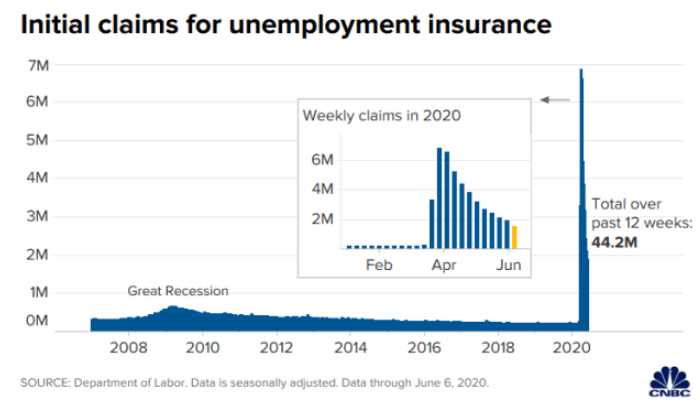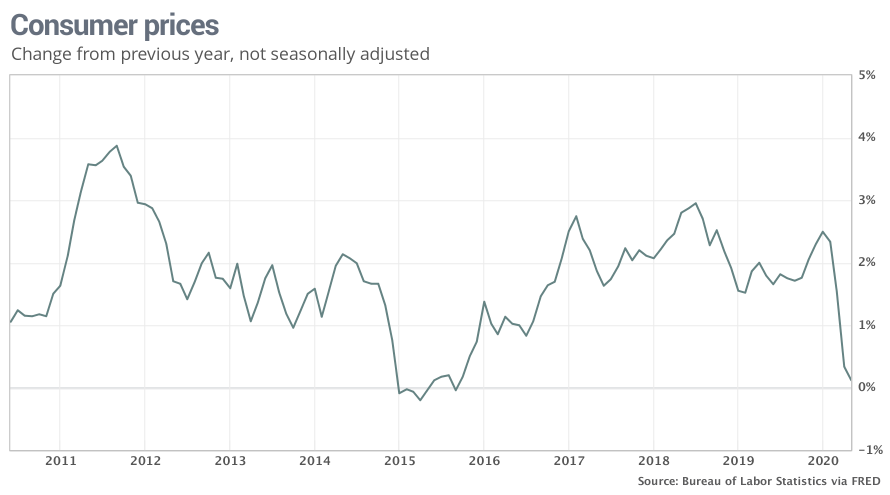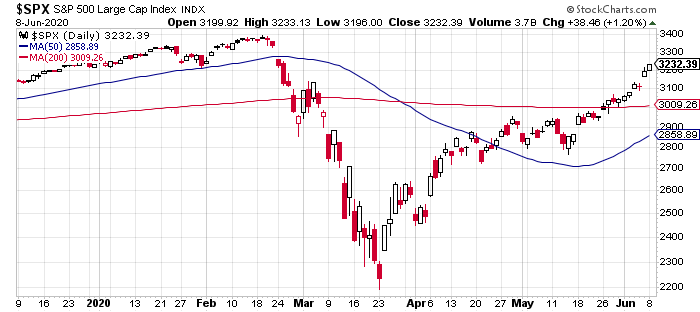Some US states reporting post-Memorial Day Covid-19 surges: WSJ
IMHE’s US model forecasts second-wave risk for Covid-19 in Q4: IMHE
US stock futures rebound in early Friday trading after Thursday’s sharp loss: CNBC
Survey shows most Americans support sweeping police reform proposals: Reuters
N. Korea all but ends diplomacy effort with US with harsh announcement: BBC
Survey: economists expect US economy to start recovering in Q3: WSJ
UK economy contracted by a shockingly steep 20% in April: Bloomberg
Eurozone industrial output down a record 17.1% in April vs. March: Reuters
US jobless claims continued to rise sharply last week: CNBC
Are Foreign Bonds Adding Value In 2020 For US Investors?
If ever there was a case for a fixed-income allocation, 2020 has delivered the goods in no uncertain terms in 2020. As the coronavirus crisis derailed equity markets around the world, bonds – government bonds, in particular – have providing critical support for portfolio strategies. But for US investors, the fixed-income edge has been primarily a domestic phenomenon. Foreign bonds, by contrast, have posted weak gains at best so far this year (through June 11), based on a set of proxy ETFs.
Macro Briefing | 11 June 2020
As Covid-19 cases top 2 million, concern lingers over a second wave: BBG
Harvard health expert: US Covid-19 deaths will double by September: CNN
Covid-19 cases are rising as economies around the world reopen: NY Times
Fed expects no interest rate increases through 2022: WSJ
US jobless claims expected to rise sharply again in today’s update: MW
Cash hoarding in Europe suggests economic recovery will be anemic: BBG
Few signs that active management capitalized on recent volatility: II
US consumer inflation’s 1-year trend fell to near zero in May: MW
New Fed Economic Projections Due Amid Dark Q2 GDP Estimates
The worst phase of the pandemic crisis in the US may be easing, but economic projections for the immediate future remain grim. Recent estimates for the upcoming second-quarter report for GDP tell the story—a tsunami of deeply negative projections. Amid the macro darkness, the Federal Reserve today, as part of a monetary statement, is scheduled to release its own set of revised economic projections.
Macro Briefing | 10 June 2020
White House adviser says new stimulus bill odds ‘are very, very high’: WSJ
OECD considers economic impact of a second coronavirus wave: Bloomberg
Worrisome Covid-19 trends in India, Brazil and South Africa: Vox
Consumer inflation in China slowed to 14-month low in May: Caixin
China’s industrial deflation continued to deepen in May: MW
What’s expected for today’s Federal Reserve meeting? CNBC
Pandemic threatens to upend business models for retail properties: NY Times
Small Business Optimism Index in the US rebounded moderately in May: NFIB
US job openings fell to a five-year low in April: CNBC
Is The Treasury Market Starting To Price In Reflation?
The clues are starting pile up that the deepest phase of the economic loss for the US coronavirus recession has passed. There’s still a long way to go to climb out of the hole, but data published to date suggest that the recovery process has started.
Macro Briefing | 9 June 2020
Politicians consider defunding police after George Floyd protests: NY Times
22 US states report rising cases of Covid-19 infections: CNN
Daily change in US Covid-19 deaths falls to new post-peak low: Reuters
North Korea cuts off communication with South Korea: CNN
India and China agree to peacefully settle border tensions: CNBC
Will strong US jobs report for May fuel a rise in Treasury yields? CNBC
Up to 25,000 US stores may close this year: Bloomberg
Longest US economic expansion on record officially ended in February: NBER
US stocks (S&P 500) closed on Monday with a fractional year-to-date gain: CNN
Real Estate Shares Surged Last Week
US and foreign property shares led returns in last week’s broad rise in global markets, based on a set of exchange traded funds tracking the major asset classes. over the trading week ended June 5.
Continue reading
Macro Briefing | 8 June 2020
Minneapolis City Council members favor ending police dept: Reuters
Some US states reporting a rise in virus cases, including California: WSJ
New Zealand says country is virus-free: BBC
Signs that the US economy is starting to recover: CNBC
Morgan Stanley bets on a steepening Treasury yield curve: Bloomberg
Was jobs surge in May a game-changer for markets and the economy? CNBC
Fed considers policy to actively peg certain rates at low levels: WSJ
Germany’s industrial output fell a record 17.9% in April: MW
US payrolls rose dramatically in May–biggest upside surprise in history: MW
US economic policy uncertainty falls to lowest level since early March: SLFed
Book Bits | 6 June 2020
● The End of Jobs: The Rise of On-Demand Workers and Agile Corporations
Jeff Wald
Summary via publisher (Post Hill Press)
The world has witnessed three step functions in technological change: mechanization, electrification, and computerization. These industrial revolutions led to massive increases in productivity and thus the need for fewer workers. With each of these technological breakthroughs, the power balance between companies and workers shifted heavily to companies. The abuses of that power by companies instigated employee unrest and sometimes even armed uprisings. Counterbalancing forces rose to constrain companies’ power, eventually prompting unions, regulation, and the social safety net to bring stability to the relationship.
Continue reading





